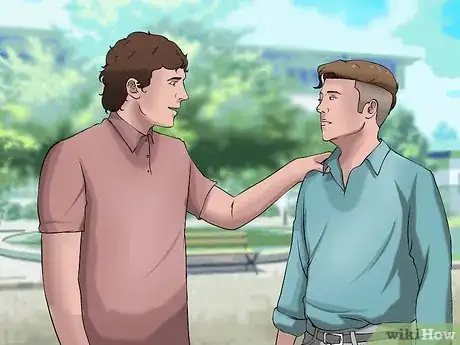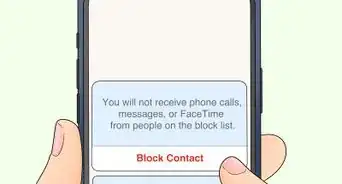This article was co-authored by Trudi Griffin, LPC, MS. Trudi Griffin is a Licensed Professional Counselor in Wisconsin specializing in Addictions and Mental Health. She provides therapy to people who struggle with addictions, mental health, and trauma in community health settings and private practice. She received her MS in Clinical Mental Health Counseling from Marquette University in 2011.
There are 11 references cited in this article, which can be found at the bottom of the page.
wikiHow marks an article as reader-approved once it receives enough positive feedback. This article received 14 testimonials and 100% of readers who voted found it helpful, earning it our reader-approved status.
This article has been viewed 308,073 times.
Whether we like it or not, we will all eventually meet, perhaps in a work or volunteer situation, an impossibly immature person. It can be damaging to your emotional life, social life, and your entire perspective. With some understanding, self-restraint, and practice you'll be able to deal with that person with ease.
Steps
Understanding Immature Behavior
-
1Consider the person's age. The word immature means “not fully developed.” By nature, the person may not understand how to respond to typical situations. The younger the person is, the more cognition may be difficult.[1] Be more understanding of immaturity in younger people.
- A young boy might, for instance, show immaturity by joking about boobs and penises, farting on his friends, picking his nose, and generally acting like a child. While obnoxious, this may simply be normal behavior for someone his age, and should probably just be ignored. Allow younger people space to grow up and mature before you get too angry.
- On the other hand, a grown person who otherwise seems mature (i.e. someone who has moved beyond fart jokes) may still lack emotional maturity — she may be inconsiderate, unable to accept blame for her mistakes, or try to make you jealous or angry on purpose.
-
2Identify emotionally mature and immature reactions. Extreme situations can sometimes trigger emotionally immature reactions, something called age regression, which can blur the lines between adult and childish emotions. React more thoughtfully when you recognize someone is reacting maturely. There are a variety of ways to glean whether the reaction is an adult or childish/immature emotion.[2]
- A person who is emotionally immature will: be reactive; see himself as a victim; act out his emotions (intense or gut reactions, like explosive anger, sudden crying, etc.); be self-centered and concerned with self-protection; appear to always be justifying his actions to himself or others; be manipulative; be motivated by fear or a feeling that he "has to" do something," as well as a need to avoid failure, discomfort, and rejection.
- A person who is showing emotional maturity will: be open to hearing others' perspectives; be proactive; be motivated by growth and act with a vision or purpose; act because he chooses to, not because he feels he must; act with integrity, meaning his actions will align with his values.
Advertisement -
3Understand why a person might be emotionally immature. People who are emotionally immature find it difficult to cope with their emotions, and often experience a learned helplessness, or feeling that she cannot change her situation or improve her life.[3] This may be because she never learned how to face and handle difficult emotions. While her immature behavior is not appropriate, it may help you to be more understanding if you realize that she is acting from a place of fear, feeling that she must protect herself from these uncomfortable emotions.
-
4Acknowledge potential mental health issues. The person you’re dealing with may be dealing with ADHD or a personality disorder. [4] Some disorders of this type may appear to be immaturity, and can manifest in various ways.
- A person with ADHD may appear to be simply "immature", but she actually has a neurodevelopmental disorder. She may have trouble paying attention and talk excessively, may appear bossy or interrupt conversations, become verbally aggressive when frustrated, or have difficulty controlling her emotions, leading to outbursts of anger or tears.[5]
- Borderline personality disorder is typically accompanied by major mood swings.
- People with antisocial personality disorder are often unkind, and lack the ability to respect your feelings.[6]
- Those with histrionic personality disorder can be very emotional in order to garner attention, and display uneasiness when not the focal point.[7]
- Narcissistic personality disorder shows itself in people who have an exaggerated view of their worth, diminished empathy towards others, and results in a vulnerability that could cause outbursts.[8]
Dealing with an Emotionally Immature Person
-
1Understand that you can't force someone to change. The truth is, this isn't your battle to fight — if the person is not willing to recognize his behavior and take steps to change it, there is little you can do. It may be particularly difficult for an emotionally immature person to realize he needs to change, as a hallmark of emotional immaturity is blaming other people or circumstances for one's bad behavior.[9]
- The only thing you can control is your behavior — how you react to the person, and how much time you spend with them.
-
2Try to limit your contact with the person. Depending on the severity of the person's immaturity and her willingness to change, you may need to cut her out of your life. If the immature person is your significant other, you may need to end the relationship if she is not willing to change. If the person is someone you can't remove from your life, such as a boss, coworker, or family member, then try to limit your contact as much as possible.
- Keep your interactions as brief as possible. Excuse yourself from conversations firmly but politely, saying something like, "I'm sorry to cut this short, but I'm in the middle of a huge project and I really need to get back to it."
- In a social setting, do your best to simply avoid her, talking to your other friends or relatives.
-
3Communicate assertively. An emotionally immature person can be manipulative and self-centered, so if you must communicate with him, try to do so clearly and assertively. Assertive does not mean aggressive — it means being clear, respectful, and stating what you need, while at the same time being respectful of other people's needs, feelings, and wants.[10] In short, you state what you need, and let go of the outcome.
- Understand that even if you maturely communicate your needs, the immature person may not respond maturely.
- Learn more about being assertive by reading this wikiHow article: How To Be Assertive.
-
4Talk to the person. If you think the person is open to hearing feedback, and she is someone you want to keep in your life, then you may want to try and talk to her about her behavior. Prepare yourself for her to become defensive, which may interfere with getting your message across. You might even suggest she talk to a counselor or someone who can help her learn how to communicate maturely.
- Name the behavior that is immature and what effects it has on you. For instance, "I feel overwhelmed when you don't take on more responsibility in the house. Would you please help me out every week?" Then give the person specific things she can do every day to help out.
- You might remind her that change can be extremely difficult, but you want to be there with her and help her grow and mature, if she's willing.
Reacting to Aggressively Immature Behavior
-
1Ignore the person and disengage. It's the easiest way and simplest reaction when the immature person is trying to get your attention or a reaction. By responding to the behavior, you're giving in to what she wants and reinforcing her immature actions. Ignoring her will likely make her frustrated with her unsuccessful attack on you, and cause her to give up.
- If the immature person is losing her temper or trying to pick an argument, it's important for you to disengage from her efforts to upset you.
- Look away from her. Turn your head or avert your eyes. Just don’t acknowledge her presence.
- Turn your back to her. Even if she circles to face you, turn around again.
- Walk away. Move with a purpose, avoiding her as quickly as possible until she stops following.
- Try an e-ignore approach. Talking to someone or bothering someone who is constantly on their phone or tablet is very difficult. You’ll be so engaged you won’t notice them.
-
2Ask the person to leave you alone. If the person won’t see reason or won't go away, you may need to be slightly confrontational and tell him that you cannot engage with him any further. Gather up all your courage and politely ask him to leave you alone, while simultaneously removing yourself from the caustic environment. Try one of the following approaches:
- Let him off easy by deflecting, “Please leave me alone right now. I’m not in a good mood.”
- Get to the point and tell him what you’d like, “Leave me alone.”
- Try a forward approach, “I'm not arguing with you. This conversation is over.”
- Use the broken record technique. Simply repeat your refusal to engage over and over, "This conversation is over." Remain calm while employing this technique and try to walk away.
-
3Inform the person of her actions. It is possible the person doesn't realize she is being immature. Part of maturing is learning to deal with younger and/or less mature people. Confronting the immature person bothering you and letting her know her actions are inappropriate may cause them to avoid you.
- Being straight-forward could help, “I do not appreciate your behavior. Please stop.”
- Simply inform her of her behavior, “You’re being very immature. Stop bugging me.”
- Form your reply as a question, “Do you realize how immature you’re acting right now?”
-
4Resist the urge to fight fire with fire. While you may be tempted to respond to the person immaturely as well, giving him a taste of his own medicine, this could seriously backfire. If you are interacting with this person in a work situation, your immature behavior could get you in trouble. In addition, it might actually be dangerous to egg on an immature person who is also aggressive or has a temper. When you feel tempted to react to the person, be the mature one and disengage and walk away from him.
-
5Get help. If the person is aggressive and won't stop bothering you, consult with a lawyer or the police. No one is allowed to harass or touch you. These people need outside influences to stop bothering you, and they probably won't until someone is able to exert influence they can't deny. There are a few possible options:
- Use your social support network. If contact with the person is unavoidable, find a friend, family member, teacher or school administrator, boss, or anyone you trust, and ask for help.
- Tell the person you’re going to call the police. The threat of authorities may intimidate him enough to stop bothering you.
- Call the police. If you fear for your safety and/or the person is harassing you, threatening you, stalking you, or has been violent, the police may be able to intervene, or you may be able to file a police report. Make sure you take detailed notes about each incident so you have a record of the harassment and how long it has been going on.
- Harassment includes threats; repeated telephone calls, texts, email, leaving notes or other contact; following someone; blackmail; slashing car tires.[11]
- Consider filing a harassment restraining order. Laws very by state, but you can talk to the police or a lawyer about your options when it comes to filing for a restraining order.
Warnings
- There is a difference between a person generally not acting their age, and someone being an abusive bully. If you feel you’re being bullied, seek further help.⧼thumbs_response⧽
References
- ↑ https://www.psychologytoday.com/blog/psychedelic-healing/201308/personality-development-immature-strategy
- ↑ http://psychcentral.com/blog/archives/2015/01/22/how-to-distinguish-between-mature-and-immature-emotions/
- ↑ http://alcoholrehab.com/addiction-recovery/addiction-and-emotional-immaturity/
- ↑ https://www.psychologytoday.com/blog/matter-personality/201108/immaturity-is-now-officially-disease
- ↑ http://www.scholastic.com/teachers/article/girls-and-adhd-are-you-missing-signs
- ↑ http://www.mayoclinic.org/diseases-conditions/antisocial-personality-disorder/basics/definition/con-20027920
- ↑ http://psychcentral.com/disorders/histrionic-personality-disorder-symptoms/
- ↑ http://www.mayoclinic.org/diseases-conditions/narcissistic-personality-disorder/basics/definition/con-20025568
- ↑ http://psychcentral.com/blog/archives/2015/01/22/how-to-distinguish-between-mature-and-immature-emotions/
- ↑ Murphy, J. (2011). Introduction. In Assertiveness: How to stand up for yourself and still win the respect of others. Kindle Books.
- ↑ http://www.lawhelpmn.org/resource/harassment-restraining-order-do-it-yourself/4B8013EE-31B9-4E50-B690-273C7D97865D
About This Article
Although you can’t do much to change the behavior of an overly immature person, you can try dealing with the situation by limiting contact with them. For example, if you’re talking to them at school or work, say something like, “I’m sorry to cut this short, but I have to get back to my project.” Alternatively, if the person is aggressively immature, ignore them and walk away so you’re not reinforcing their immature actions. If that’s not an option, ask them directly to leave you alone by saying “I’m not arguing with you. This conversation is over.” For tips from our Mental Health reviewer about how to identify emotionally immature reactions, read on!












































































